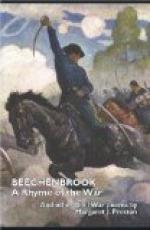“That’s music for heroes in battle array! Oh, mother! I feel like a Roman to-day! The Romans I read of in Plutarch;—Yes, men Thought it noble to die for their liberties then! And I’ve wondered if soldiers were ever so bold, So gallant and brave, as those heroes of old. —There!—listen!—that volley peals out the reply; They prove it is sweet for their country to die: How grand it must be! what a pride! what a joy! —And I can do nothing: I’m only a boy!”
The fervid hand drops as he
ceases to speak,
And the eloquent crimson fades
out on his cheek.
“Oh, Beverly!—brother!
It never would do!
Who comforts mamma, and who
helps her like you?
She sends to the battle her
darlingest one,—
She could not give both of
them,—husband and son;
If she lose you, what’s
left her in life to enjoy?
—Oh, no! I
am glad you are only a boy.”
And Sophy looks up with her
tenderest air,
And kisses the fingers that
toy with her hair.
For her, who all silent and
motionless stands,
And over her heart locks her
quivering hands,
With white lips apart, and
with eyes that dilate,
As if the low thunder were
sounding her fate,—
What racking suspenses, what
agonies stir,
What spectres these echoes
are rousing for her!
Brave-natur’d, yet quaking,—high-souled,
yet so pale,—
Is it thus that the wife of
a soldier should quail,
And shudder and shrink at
the boom of a gun,
As only a faint-hearted girl
should have done?
Ah! wait until custom has
blunted the keen,
Cutting edge of that sound,
and no woman, I ween,
Will hear it with pulses more
equal, more free
From feminine terrors and
weakness, than she.
The sun sinks serenely; a
lingering look
He flings at the mists that
steal over the brook,
Like nuns that come forth
in the twilight to pray,
Till their blushes are seen
through their mantles of grey.
The gay-hearted children,
but lightly oppressed,
Find perfect relief on their
pillow of rest:
For Alice, no bless’d
forgetfulness comes;—
The wail of the bugles,—the
roll of the drums,—
The musket’s sharp crack,—the
artillery’s roar,—
The flashing of bayonets dripping
with gore,—
The moans of the dying,—the
horror, the dread,
The ghastliness gathering
over the dead,—
Oh! these are the visions
of anguish and pain,—
The phantoms of terror that
troop through her brain!
She pauses again and again
on the floor,
Which the moonlight has brightened
so mockingly o’er;
She wrings her cold hands
with a groan of despair;
—“Oh, God!
have compassion!—my darling is there!”
All placidly, dewily, freshly,
the dawn
Comes stealing in pulseless
tranquility on:
More freely she breathes,
in its balminess, though
The forehead it kisses is
pallid with woe.




